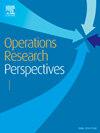信息披露与智能技术集成对电子零售绩效的影响:一个产品交付政策框架
IF 3.7
4区 管理学
Q2 OPERATIONS RESEARCH & MANAGEMENT SCIENCE
引用次数: 0
摘要
与纯粹的线下零售商相比,电子零售商在信息共享方面面临着明显的挑战,特别是在向越来越有环保意识的消费者透明地传达他们的环保实践方面。由于缺乏直接的互动,这种复杂性在电子零售中增加了,这使得消费者很难评估零售渠道利益相关者的可持续性努力。为了应对这种情况,制造商和电子零售商正在利用社交媒体和区块链技术进行个性化广告,以弥合信息透明度的差距。本研究以资讯披露和环境足迹减少为目标,结合多种配送政策和技术投资,提出了电子零售中制造商-零售商合作的可持续多项目整合模型。制造商采用智能生产系统,在制造过程中重复使用退货,同时投资绿色减排技术。同时,电子零售商通过在社交媒体和区块链上的信息披露技术,展示他们的环保努力,提高产品需求。通过采用混合分析-元启发式方法,我们确定了在不同预算和空间约束下改善绿色消费者服务的最佳生产和交付政策。结果表明,通过信息共享,协同零售系统的在线消费者需求增加了4.39%,盈利能力提高了3.86%,验证了所提模型的稳健性。场景分析通过展示将传统生产转化为智能生产系统,系统利润增加8.44%,进一步为决策者提供可操作的见解。此外,该模型对平衡排放控制和信息披露努力之间的技术投资的敏感性建议在进行技术预算分配之前跟踪这些投资选项的效率参数。本文章由计算机程序翻译,如有差异,请以英文原文为准。

The impact of information disclosure and smart technology integration on e-retailing performance: A production delivery policy framework
The electronic retailers face distinct challenges in information sharing compared to their purely offline counterparts, particularly in transparently communicating their environmental practices to increasingly eco-conscious consumers. This complexity increases in e-retailing due to the absence of direct interaction and makes it difficult for consumers to evaluate the sustainability efforts of retailing channel’s stakeholders. In response to it, manufacturers and e-retailers are leveraging social media and blockchain technology for personalized advertising to bridge this information transparency gap. This research presents a sustainable multi-item integrated model for manufacturer–retailer collaboration in e-retailing by incorporating multiple delivery policies and investments in technology aimed at information disclosure and environmental footprint reduction. The manufacturer adopts a smart production system and reuse returned goods in the manufacturing process while investing in Green Emissions Reduction Technology. Meanwhile, the e-retailer enhances product demand through Information Disclosure Technology on social media and blockchain by showcasing their environmental protection efforts. By employing a hybrid analytic-metaheuristic approach, we determine optimal production and delivery policies to improve green consumer service under varying budgetary and spatial constraints. The results demonstrate a 4.39% increase in online consumer demand through information sharing and a 3.86% improvement in profitability of the collaborative retailing system under single-setup multi-delivery policy that confirms robustness of the proposed model. Scenario analysis further provides decision-makers with actionable insights by showcasing 8.44% increment in the system profit by converting traditional production into smart production system. Moreover, the sensitivity of the proposed model to balancing the technology investments among emission control and information disclosure efforts suggests keeping track of the efficiency parameters of these investment options before making technology budget allocations.
求助全文
通过发布文献求助,成功后即可免费获取论文全文。
去求助
来源期刊

Operations Research Perspectives
Mathematics-Statistics and Probability
CiteScore
6.40
自引率
0.00%
发文量
36
审稿时长
27 days
 求助内容:
求助内容: 应助结果提醒方式:
应助结果提醒方式:


